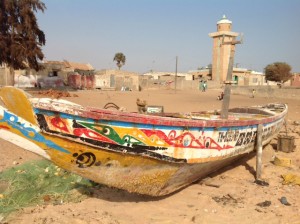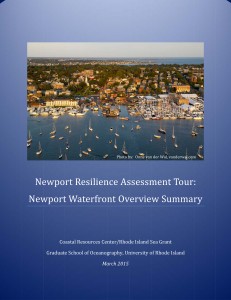Sea level rise as it relates to historic preservation is the topic of a conference in Newport, RI, in April. Reserve your spot now. CRC’s Dawn Kotowicz and Teresa Crean are on the program committee for the conference “History Above Water.” http://www.historyabovewater.org/
Tag Archives: climate change
“Fortified Home” Sets New Standard in Resilient Construction
Check out Rhode Island’s first home built to “Fortified Home,” certification standards. This voluntary standard set forth by the Insurance Institute for Business and Home Safety is designed for increased resistance to storm damage. Two other homes in Rhode Island are being built or renovated to Fortified specifications, according CRC’s Pam Rubinoff. Stay tuned for more on CRC’s involvement in this important coastal resilience development.
J-Term Class in Senegal

A URI Winter J-Term course on Sustainability and Climate Agility will be offered in Senegal, West Africa, Jan. 4-18, 2016.
J-Term courses take place during the winter break between semesters and include several study-abroad options. This program will allow students to explore mangrove estuaries, local townships and urban environments in Senegal on the coast of West Africa to better understand sustainable resource management and mitigation of habitat loss, ecosystem-based fisheries management and the challenges that climate change brings to those issues. CRC has several years of experience working in sustainable fisheries and climate change in Senegal through the USAID-funded Collaborative Management for a Sustainable Fisheries Future (COMFISH) project.
Click here to learn more or enroll in this one-of-a-kind learning experience in West Africa.
Report on Newport Resilience Assessment Tour Completed
 CRC has recently published a report providing an overview summary of the Newport Resilience Assessment Tour (NRAT), which CRC led in the summer of 2014 along with its partners at R.I. Sea Grant and R.I. CRMC.
CRC has recently published a report providing an overview summary of the Newport Resilience Assessment Tour (NRAT), which CRC led in the summer of 2014 along with its partners at R.I. Sea Grant and R.I. CRMC.
NRAT was conducted as a climate change adaptation effort concentrating on Newport, RI, waterfront and a conducted through the participation of several businesses and organizations interested in receiving recommendations for protecting their property and assets from storm damage and sea level rise.
The assessment tour and report were completed as part of the R.I. Shoreline Change Management Plan (Beach SAMP).
CRC’s Teresa Crean Featured in Hurricane Program
CRC’s Teresa Crean is featured in WJAR Channel 10’s Hurricane 2015 special segment. Teresa discusses the online STORMTOOLS, simplified flooding maps, for assessing your property’s risk and ways to be prepared before a storm hits.
CRC Working with Homeland Security on Coastal Resilience
Coastal communities nationally stand to benefit from CRC’s expertise now that the federal government has tapped the center to share, and enhance further, the tools and techniques it has introduced in Rhode Island to encourage adaptation to flooding and erosion, key impacts of storms and sea level rise. The U.S. Department of Homeland Security chose CRC in May for its outreach work that is enabling government, community and private sector partners to understand the science of climate change risks and to institute wise guidance and practices to protect homes, businesses, infrastructure and historical and cultural public assets for the long haul. CRC is part of a University of Rhode Island contingent for the project which involves a national cadre of academic partners and is expected to provide the country with models and tools for coastal communities to replicate on a larger scale. The federal government has tapped the center to share, and enhance further, the tools and techniques it has introduced in Rhode Island to encourage adaptation to flooding and erosion, key impacts of storms and sea level rise.
CRC is part of a University of Rhode Island contingent for the project which involves a national cadre of academic partners and is expected to provide the country with models and tools for coastal communities to replicate on a larger scale. You can learn more here.
Malawi FISH Project in the News
The launch of USAID/Malawi FISH project, for which CRC is a key partner, recently attracted some media attention in Africa. For this five-year project CRC is partnering with the international non-governmental organization Pact to provide technical expertise regarding the development and implementation of sustainable fisheries co-management plans. The primary objectives of FISH are: “1) increase resiliency to climate change (CCA) and 2) improve biodiversity conservation (BDC), through effective sustainable fisheries co-management” by adopting evidence based best practices from lessons learned.
Coastal Institute/RI Sea Grant Magazine Features International Coastal Resilience Work
CRC’s work addressing coastal erosion and resilience in the less-developed world is featured in the latest issue of the URI Coastal Institute/Rhode Island Sea Grant magazine, “41 Degrees North.”
UPDATE: March 3 Beach SAMP Meeting Canceled
The Beach SAMP Stakeholder Meeting scheduled for Tuesday, March 3, has been canceled. It will be rescheduled, and the new date will be posted here when available.
Reminder: Beach SAMP Stakeholder Meeting is March 3
Don’t forget to attend the next Beach SAMP Stakeholder Meeting Tuesday, March 3, from 6 to 8 p.m. at the Coastal Institute Auditorium, URI Narragansett Bay Campus. The topic is “How Can Coastal Engineering Contribute to Resilient Coastal Communities. Christopher P. Jones, P.E., will address the question: “Coastal engineering can counteract some of the processes and forces attacking our shorelines and communities, but what are the practical and financial limits? Jones is a registered professional engineer specializing in coastal hazard identification, hazard mitigation and coastal engineering with more than 30 years of experience.
Pizza will be served at 5:30 p.m. RSVP to beachSAMP@etal.uri.edu
This Beach SAMP stakeholder meeting is cosponsored by RI Flood Mitigation Association (RIFMA)


